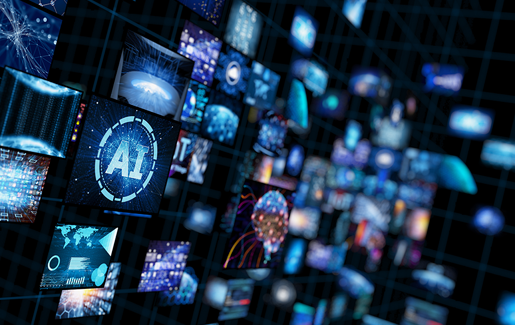
Artificial intelligence is a term that still conjures images of sci-fi thrillers for the average user. While the stigma may not have fully dissipated from dystopian cinema, AI is most commonly used in the business world.
Brands that we see with regularity are engaging in AI projects to help them become more efficient and productive businesses. Companies such as Google, IBM, Salesforce, Facebook and many others are implementing AI in everyday operations and many more are seeing the vast potential offered by machine learning and AI technology.
Artificial Intelligence and Business Today
SEM Rush reports that AI is expected to create significant business value and enhance worker capabilities. “In 2021, the increase in AI usage across businesses will create $2.9 trillion of business value and 6.2 billion hours of worker productivity.” From predictive analytics and deep learning to chatbots and image recognition, AI and machine learning are revolutionizing how businesses are able to engage with customers and deliver more in less time.
AI technology can be applied in many different use cases across industries of all varieties, including healthcare, sales, HR, operations, manufacturing, marketing and of course, technology. Commonly discussed use cases for AI include self-driving cars and other autonomous technology, internet of things (IOT), medical diagnosis, robotic assistance in manufacturing, contactless shopping, job candidate selection and so much more. The possibilities for business are boundless. But, in order to integrate AI and machine learning technology into business, we must have a workforce that is equipped to manage the technology.
How Are Businesses Using Artificial Intelligence?
AI software has various business applications. Despite movie portrayals, this has not yet manifested itself as sentient robots, but rather AI has become a behind-the-scenes player to help businesses enhance efficiency, streamline workflows and increase productivity.
- Personalization: AI makes it possible to enhance the experience for customers with personalization.
- For retailers, AI technology is capable of making product recommendations based on shopping history and past interests.
- Social media platforms can use it to determine the type of content users want to see.
- Amazon uses natural language processing to allow users to communicate with Alexa.
- Media streaming dominator Netflix is widely known to use AI to make viewing recommendations and dynamically populate content based on user interests.
- Process automation: AI is particularly useful for automating certain business processes, known as robotic process automation (RPA). Leading companies such as Deloitte, IBM, Microsoft and LinkedIn regularly use RPA to automate rote tasks.
- Customer service: The purchasing journey is now motivated largely by online research and contactless options. Other e-commerce consumer trends such as hyper-personalization, comparison shopping and ease of purchasing has led many companies to embrace AI to enable a streamlined approach to customer service. From chatbots to multi-channel experiences, AI is often applied to provide an enhanced customer experience. Amazon is among those who are utilizing AI solutions to improve customer service.
- Increase output: Many leading companies are using AI and robotics to ramp up the manufacturing process to deliver more output in less time. Forbes reports that Nissan is piloting the use of AI in an attempt to design new models in real time, hoping to shorten the time to market for new models.
- Data analysis: One of the most commonly used AI applications in today’s business is data analysis. Using predictive analytics and data from multiple sources, Google is now able to perform tasks with AI based on the analysis of information. For example, using data such as home address, calendar entries, maps and flight information, Google can now recommend when you should leave for your flight.
What AI Means for the Worker
AI tends to evoke negative feelings for workers. Employees often assume that embracing AI means eliminating the human element from jobs. According to Forbes, 34% of employees expect their jobs to be replaced by 2023. With so many concerns about job stability arising from AI, much of the workforce has developed a lack of trust in the technology. While AI systems may one day eliminate jobs that are based on rote tasks (such as assembly line positions), AI actually offers the potential for more jobs, not less.
One paper from MIT titled Artificial Intelligence and the Future of Work discusses how AI will impact the future workforce. While many naysayers expect widespread elimination of jobs, workers are needed to support innovation and AI capabilities. This can be likened to any major revolutionary shift in history, such as the adoption of electricity and cars.
The paper reports that AI will actually grow the job market in ways we can’t even currently predict. According to Forbes, “AI will continue to drive massive innovation that will fuel many existing industries and could have the potential to create many new sectors for growth, ultimately leading to the creation of more jobs.”
While movies may portray AI as ultra-intelligent technology capable of human domination, real-world AI is typically only capable of singular tasks, requiring human intervention to support and apply technology in the workforce.
Business Benefits of AI
It’s clear that the use of AI poses significant business benefits. This is what you can expect from an investment into artificial intelligence technology.
- Reduced operational time: Many operational tasks can be automated with AI, freeing up business leaders to tackle more complicated business problems and decision making.
- Cost reduction: Tasks such as data analysis that consume many hours for human resources can be processed within seconds by AI technology, allowing businesses to save significantly on salaries and boost revenue.
- Limited human error: Human fallibility is a reality. While humans are needed to supply context and understand nuanced situations, data science certainly benefits from reduced error, allowing for more accurate predictions and data analytics.
- Greater business insight: Forecasting is a common business practice that benefits from AI capabilities. Companies have long been trying to predict market shifts and consumer interests in an attempt to prepare for what is coming. AI can process billions of data points in seconds and even use historical data to predict future outcomes with a high level of accuracy, allowing businesses to make more informed decisions.
The Challenges of AI
Even though the benefits of AI are many, embracing the next technical revolution is not without its challenges.
There is lack of trust in AI technology. From expectations that AI will replace jobs to concerns about data privacy and security, there persists a lack of trust in AI technology. This presents a significant challenge for businesses as they work to instill confidence in the new technology that powers their operations and ensure that the necessary cybersecurity measures are in place to protect consumer data.
The workforce is not equipped to manage the rise in AI technology. To ensure that AI technology functions as anticipated, we need a skilled workforce to manage it. Until businesses can upskill their workforce to meet AI-focused challenges, we will likely see some stagnation in AI adoption.
AI technology requires a wealth of clean data. AI is only as good as the data we use to train machine learning algorithms. Without a vast amount of clean data sets, AI will be limited in its ability to learn and analyze.
AI requires large amounts of computing power. Analysis of billions and billions of data points requires super computing powers and that kind of technical hardware doesn’t come cheap. To truly take advantage of the capabilities offered by AI and big data, businesses will need enterprise-level computing resources.
While AI certainly offers the potential for business growth and advancement, it isn’t without challenges. In order for businesses to be able to capitalize on that potential, they will need to create an environment where AI use is trusted, safe and supported. Only then will we truly see the promise of AI delivered.
Is AI right for your business? Learn what you should consider before implementing AI.


 Add CompTIA to your favorite RSS reader
Add CompTIA to your favorite RSS reader

